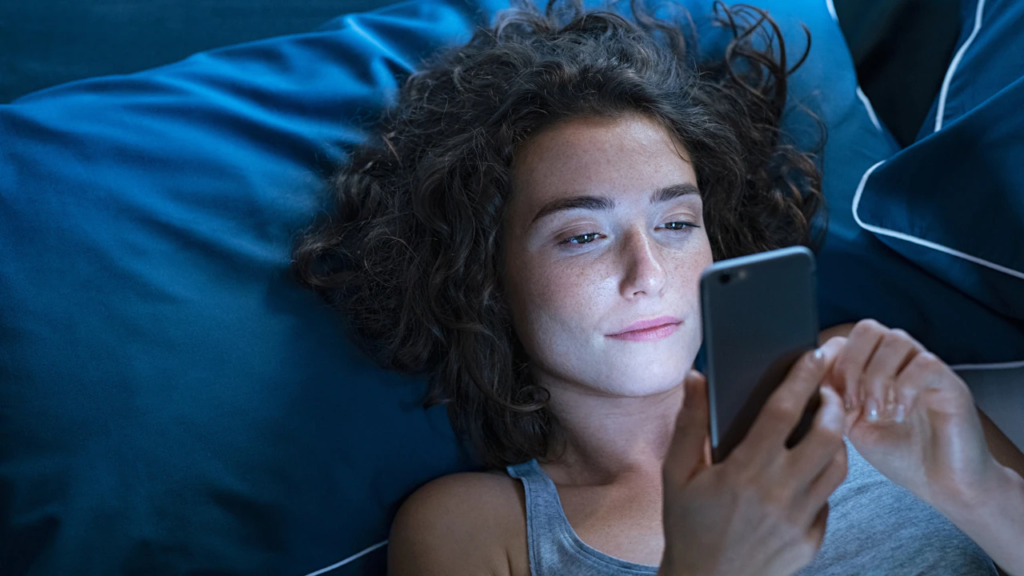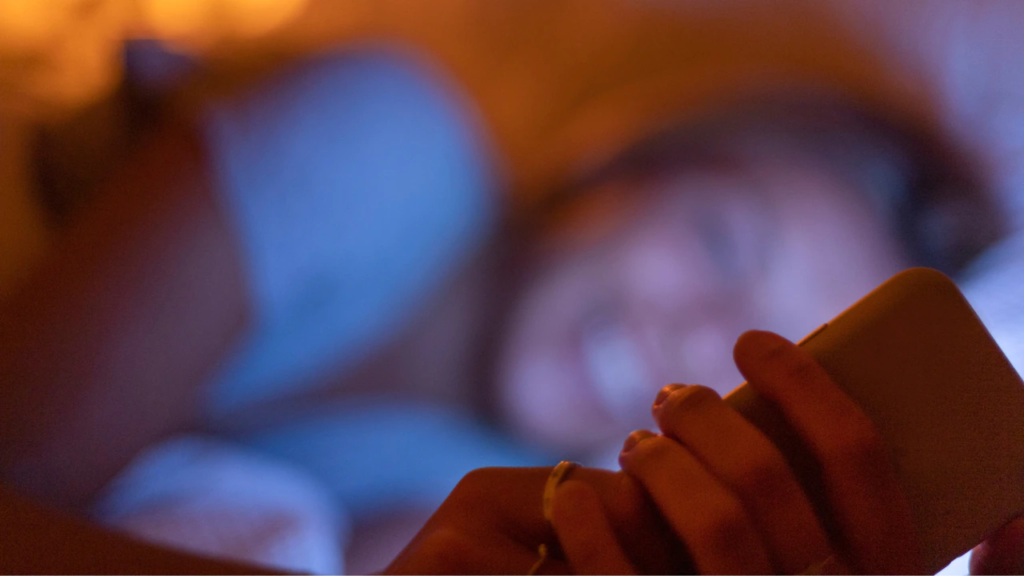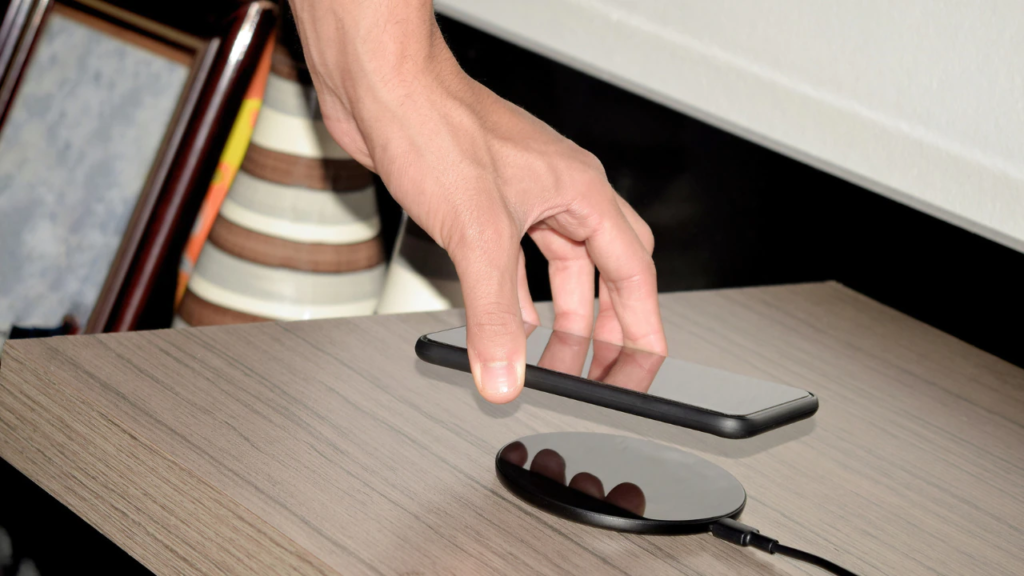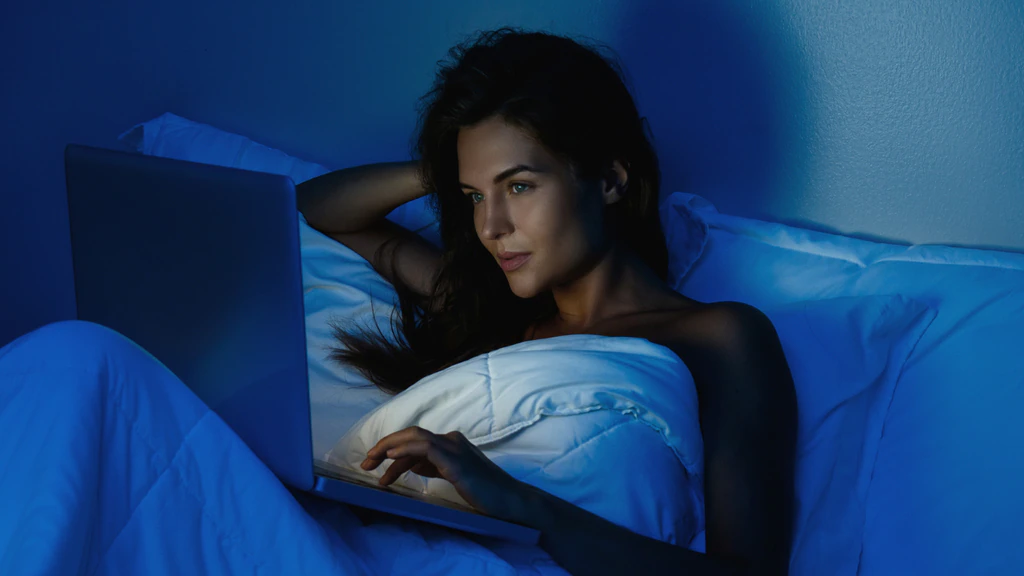Sleep: it’s free. And we all want more of it, so why is it so hard to get? Specifically – that consistent, restorative, uninterrupted, eight-hours-a-night kinda sleep. Which is why we’ve enlisted Sydney-based sleep expert Olivia Arezzolo to solve our myriad of sleep concerns with our Sleep Well Wednesdays series. Check back every fortnight and you’ll be off to the land of nod before you know it.
Disconnecting from technology is the one thing that will help you sleep better. I know we’ve all heard it before, but we’re not taking action.
If you want to sleep deeper and wake up less through the night, disconnecting before you go to bed is key and here is the specific action plan you need to implement it.
Knowing the science is one thing, having a strategy is another and this piece gives you both.
How melatonin and blue light affect your sleep
I harp on about blue light a lot, and for good reason: it’s really, really problematic for your sleep. Specifically, it inhibits melatonin, your sleepiness hormone.
As a result, you’re likely to have difficulties falling asleep, and staying asleep and will ultimately wake feeling exhausted. Less melatonin means your body will spend more time in lighter, unrefreshing sleep stages (stage 1 and 2 NREM), at the expense of stage 3 and 4 NREM, and REM sleep, which are the stages you need to rejuvenate your body.
According to The Guardian, a 2012 study found that using a phone and laptop in the hour before bed increased the likelihood of taking over an hour to fall asleep by 48 per cent and 52 per cent respectively.
In addition, a 2017 study undertaken by the University of Pittsburgh School of Medicine, found that using social media in the 30 minutes prior to bed increases your likelihood of disturbed sleep by 62 per cent, which means waking up through the night.

Why dopamine and the reward pathway make it hard to disconnect
Dopamine is a happiness hormone. It makes us feel good, really, good. When we scroll on social media, watch our favourite show or enjoy time on our laptop, this brain region lights up, making us feel great.
The problem is, as a result, this overrides our frontal lobe, our rational brain centre, meaning we can’t make logical decisions, like saying to ourselves “ok, it’s bedtime now!”
Ultimately, dopamine makes us ignore what we ‘should’ do for long term gain, in exchange for immediate, short-term pleasure. And as hard as you try to overpower this system, it’s a primal urge that is at the centre of addiction.
You may not think of yourself as an addict, however, if you recognise that something is harmful, yet still engage in the behaviour, night after night, it’s a reasonable conclusion that perhaps, even just slightly, you, me, and we are addicted.
This is exactly why technology is so problematic. Even though we know it’s bad, it’s ingrained in us, literally.

How our devices trigger psychological cues
Psychological cues from our devices trigger us to think about all the pleasure we gain from loading social media or binge-watching TV.
Due to the deeply etched relationship between devices and this sense of pleasure, this means whenever you see a device that gives you this happiness, you automatically start craving its use, because you crave the pleasure that you expect to come.
This is why keeping your phone next to you cannot happen, nor should you keep a TV in your room. Your sleep sanctuary should be tech-free, as should your bedtime routine.

Your plan to ditch the phone and disconnect
The science is clear, and here’s a step-by-step plan for disconnecting, including overcoming your hesitation.
1. Find your why
Get super specific and understand exactly what you’re gaining from disconnecting from tech. When we focus on what we attain, rather than lose, it’s a much easier trade-off. Write it down and put it next to your bed – where your phone used to live.
2. Create a tech-free space
Bedrooms are for beds, not TVs.
3. Charge your phone outside of the bedroom.
It’s too easy when it is within reach so specifying this point for a valid reason.
4. Get an alarm clock
Because I’m anticipating that the next thing you were going to say was, “but I use my phone for my alarm!”
5. Create a ‘disconnect from tech’ alarm
I recommend setting an alarm at least one hour before bed, and at this time, your phone goes on charge, outside of the bedroom. Labelling it “sleep better” reminds you why you’re doing it.
6. Create a habit tracker
Quite simply, get a sheet of paper, and write down in two columns “no tech in the bedroom” and ‘disconnect from tech 30/60/120 minutes before bed.”
Then, create the labels 1-30 in rows. Each night, when you disconnect from tech and put your phone on the charge in the other room, tick both. If you didn’t do it, be honest with yourself.
7. Track your habits over time
Each week, review your habit tracker and workshop your successes and challenges, and understand why you’ve had setbacks if they’ve arisen.
8. Set an aim, and celebrate your wins!
If you achieve 7/7 nights, what will you gain, outside of better sleep and feeling more energetic? Give yourself greater pleasure than you would have received by enjoying a massage, some new pjs or a new sheet set. You’ve earned it!

+ show Comments
- Hide Comments
add a comment